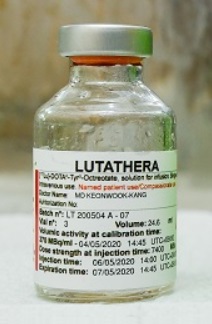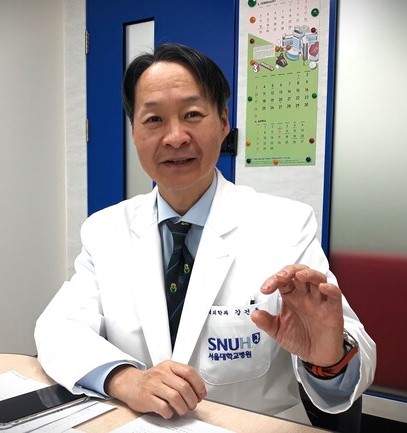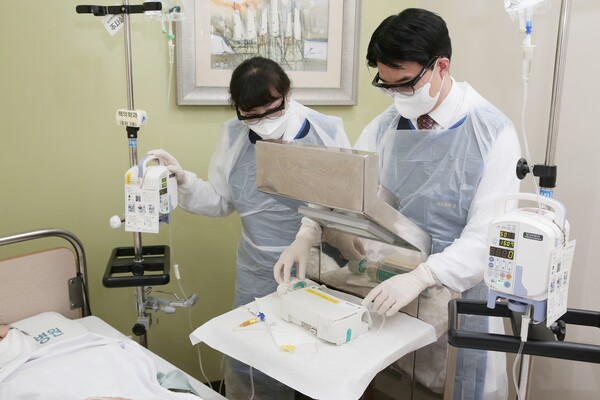Koreans with neuroendocrine tumors have been forced to leave for overseas treatment due to the restriction on the number of domestic treatments -- four reimbursed and two non-reimbursed treatments -- using Lutathera (lutetium oxodotreotide), a radiopharmaceutical treatment.

After persistent advocacy, there appears to be progress towards allowing neuroendocrine tumor patients to receive treatment at home, according to multiple sources.
According to Jin Mi-hyang, chairwoman of the Korean Neuroendocrine Tumor Association, the health authorities showed their willingness to actively improve the situation of neuroendocrine tumor patients receiving Lutathera treatment overseas at a meeting between patients, the Ministry of Health and Welfare, and the Health Insurance Review and Assessment Service early this month.
The solution they presented was to expand treatment opportunities using the “non-reimbursed use authorization system for drugs beyond permitted or reported scopes.”
If a medical institution submits medical papers on the effectiveness and safety of more than six treatments with lutetium-based radiopharmaceuticals with the same chemical structure as Lutathera to the review committee, it will actively review them and, based on the evidence of such papers, provide more opportunities for non-reimbursed treatment in addition to the existing four reimbursed treatments and two non-reimbursed treatments.
"At the meeting, we shared with the Ministry of Health and Welfare and HIRA five documents that were published by investigating the effects and side effects after more than six treatments with a lutetium-based radiopharmaceutical that is not Lutathera but has the same chemical structure as Lutathera," Jin said. "HIRA will decide whether to accept these data, but the atmosphere of the meeting was one in which the officials would actively respond if a nursing institution applies."
Health authorities reiterated their commitment to improving treatment options for neuroendocrine tumor patients, reaffirming their support for Lutathera's introduction in Korea, sources said. This is a change in attitude just 20 days after HIRA responded, "It is difficult to lift the limit on the number of treatments because that’s how the health insurance benefits were approved."

"After the meeting between the patient association and the government, we received a message from Oh Chang-hyun, director of the Insurance and Pharmaceutical Affairs Division at the Ministry of Health and Welfare, who said that if medical institutions apply HIRA to expand the number of permitted treatments with supporting data, the ministry will quickly review it," said Professor Kang Keon-wook of the Department of Nuclear Medicine at Seoul National University Hospital.
Currently, medical professionals from the nuclear medicine departments of six hospitals - Seoul National University Hospital, Severance Hospital, Seoul National University Bundang Hospital, Samsung Medical Center, the Catholic University of Korea St. Mary's Hospital, and Asan Medical Center -- are preparing to submit data, Professor Kang added.
However, the Ministry of Health and Welfare's proposed "off-label use approval system for drugs that exceed approved or reported scopes” may not entirely prevent Korean neuroendocrine tumor patients from going abroad for treatment, the sources said.
Updated global medical papers on lutetium therapy contain up to eight treatments and safety profiles, which means the ministry’s proposal will only allow a maximum of two more treatments than now in Korea, they noted.
Unlike clinical trials for other anticancer drugs, clinical trials for radiopharmaceuticals are conducted at a "minimal" level until the treatment effect is proven. This is because, unlike other anticancer drugs, radiopharmaceuticals are expensive to produce, and the short half-life of the isotopes pushes transportation costs high, resulting in a single treatment cost of about 10 million won ($7,280) in clinical research.
For this reason, pharmaceutical companies seek approval when conducting clinical research on radiopharmaceuticals by conducting the minimum number of treatments to demonstrate the drug's effectiveness. This is why Lutathera's global license is "a total of four doses at eight-week intervals.”
It is common knowledge in the field of nuclear medicine treatment that all pharmaceutical companies do not want to conduct further clinical studies with radiopharmaceuticals because even if this “minimum treatment” produces meaningful clinical data, other countries except Korea respect the opinions of medical experts and do not prevent the use of the drug by limiting the number of treatments.

Lutathera has no side effects and can be given 20 times to patients with neuroendocrine tumors as long as it continues to work. However, due to the limitations of clinical trials of radiopharmaceuticals that are nuclear medicine treatments, lutetium treatment in Korea can only be given a maximum of eight times based on clinical studies and other evidence, even if it is improved as proposed by the Ministry of Health and Welfare.
The government is trying to solve the problem within the framework defined by a ministry notification, “Standards and Procedures for Approval of Non-Benefit Use of Drugs Exceeding the Scope of Approval or Declaration.” However, the notification, which is based on evidence from clinical studies, cannot completely change the reality where neuroendocrine tumor patients are forced to go abroad for treatment.
"We are in a position to accept even two additional treatments for neuroendocrine tumor patients who have to go abroad," Jin said. "If the total number of domestic ruthenium treatments is limited to eight, we plan to continue our improvement activities. We will work to enact the Radiopharmaceutical Act in the next National Assembly so that patients can receive treatment without any restrictions on the number of treatments.
Professor Kang also said, "We are planning to submit evidence to HIRA to expand the number of ruthenium treatments in Korea as proposed by the government, but this will not solve the fundamental problem. As a result, we think the system must be changed."
The patient group’s plan to enact a radiopharmaceutical law is one alternative to stop overseas treatment, but some medical insiders said there is an easier way. Article 54 of the Pharmaceutical Affairs Act, which deals with radiopharmaceuticals, or its subordinate rules of the enforcement decree and implementing rules, can be amended to guarantee the right of Korean cancer patients to be treated with radiopharmaceuticals for an unlimited number of times; they noted.
"Currently, there is a provision for radiopharmaceuticals in the Pharmaceutical Affairs Act, but all it says is, ‘The Minister of Food and Drug Safety may prescribe matters necessary for the manufacture and importation of radiopharmaceuticals in consultation with the Minister of Science and ICT,'" Professor Kang said. "Other than what the Minister of Food and Drug Safety and the Minister of Science and ICT have prescribed, there is nothing about radiopharmaceuticals in the Pharmaceutical Affairs Act and its subordinate laws and regulations, so we should include the special situation of radiopharmaceuticals in the Pharmaceutical Affairs Act to ensure that Korean cancer patients have the opportunity to be treated at home."
Related articles
- Why are there radiotherapy limits for neuroendocrine tumors if there aren't any for thyroid cancer?
- Cancer patient group blasts Seoul for limiting treatment opportunities at home
- Neuroendocrine tumor patients petition to lift Lutathera treatment restrictions
- Restriction on Lutathera treating neuroendocrine tumors eased this month

